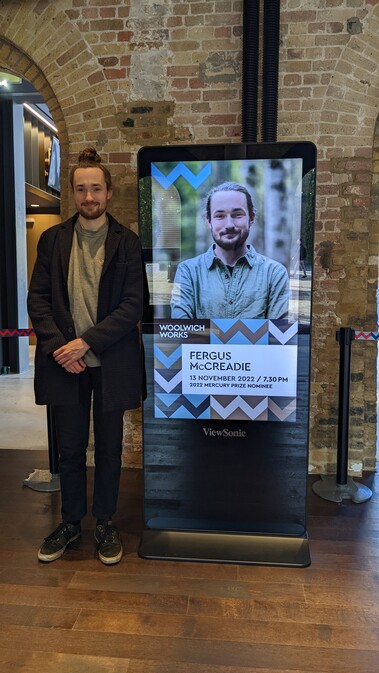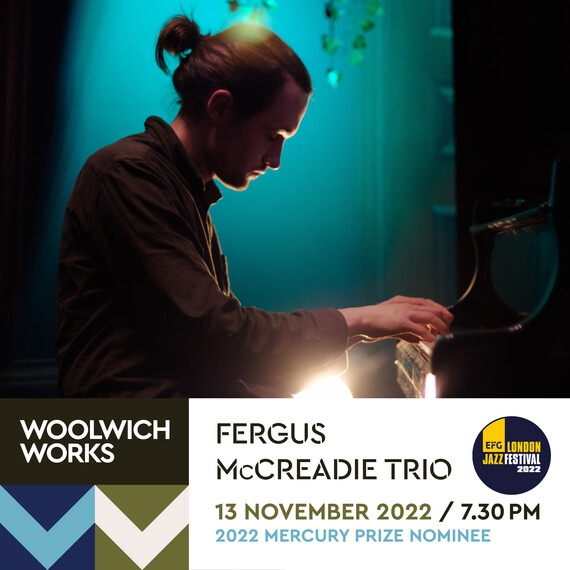News Story
The 2022 Mercury Prize nominee and Scottish Album of the Year winner will be in Woolwich for his only London date this year, so we sat down with him ahead of his trio's Fireworks Factory show to hear all about his process on stage, how the trio came together and his biggest influences!
Hi Fergus, congratulations on your recent wins for Scottish Album of the Year and Jazz FM’s Instrumentalist Of The Year, as well as your Mercury Prize nomination! Please describe your sound and live show in just a few words.
I would say it’s different every time, the live show - it’s very different from the album. I always keep in mind the way where we’re playing - really we’re playing folk songs that I’ve written but with the approach of jazz, so we’re kind of improvising around that sound world. That’s about as succinctly as I can put it.
Can you tell us a bit about what you’ll be bringing to your set for London Jazz Festival at Woolwich Works?
It’s our first London show in a while and our very first London Jazz Festival gig, and I think we’re just going to try and bring the same energy we bring to every show, which is that the show will be really unique - it’ll be a one-off thing. We never plan the set lists so it’s quite nice to just go into the show and have that complete freedom to just see what happens, and what will happen will happen. Sometimes we play sets with none of our own tunes at all, it’s just completely improvising. It will be a unique experience.
Who’s going to be joining you on stage as part of the Fergus McCreadie Trio?
In the trio, it’s David Bowden on bass and Stephen Henderson on drums, and we’ve been playing together for maybe about 8 years now. I met them both when I started studying at the Royal Conservatoire of Scotland - I was in first year and they were in their fourth year (the scary fourth years at the time!). We’ve become really good friends and really close musically, and I think they’re both just such amazing musicians. David is the most solid, he really is the foundation of the music in a lot of ways because he really provides that harmonic and rhythmic context. I just love playing with Stephen as well for that level of interaction that he brings. They’re both always with you the whole way and I try and be the same so that even though it’s my name on the trio, it’s three equal parts in the way that we play and we’re all going with each other, and trying to make each other sound good. And that’s when the good stuff happens I think.

How does it feel to be back in the swing of performing to a live audience after your lockdown piano sessions streamed online?
It’s interesting because in lockdown I think I changed actually quite a lot as a musician. I had so much more time to practice and I initially found that the motivation to practice was quite difficult, but once I got into the routine of it and started practising a lot more I got myself a good technical routine. So I think I’ve managed to improve. I feel like I have more stuff under my fingers than I did before because I’ve had the time to make that happen. So actually it feels really nice after all that time sitting alone practising to actually get back out and play with other people and bring music back to being live. I really loved the streams - they were great and there was quite a nice regular audience that watched them, but it's so great to play live. Nothing beats it.
When you’re playing together live are you making eye contact for visual cues, or is at all reacting to what you’re hearing?
Generally, it’s mostly audio. I usually close my eyes when I play, but if I want to really make that connection happen I’ll look at the two of them, or they’ll look at me. You know as a musician you have to not be afraid of eye contact and not let that become an awkward thing. Sometimes I need to cue sections and tunes, or sometimes I want to make it really obvious that I’m going to do a certain thing when I’m improvising so I’ll give a look, and David and Hendo usually know what that means. So for big changes in the music I’ll give a cue, but generally we follow our own ears.


Are there any pieces you’re particularly excited to play live?
Honestly, in terms of pieces, not necessarily because we never plan the sets and try and make it as open as possible. Maybe 30 seconds before we go on stage I’ll say let’s start with this one and that one will be the catalyst for the rest of the set. But generally, I don’t plan it so much. We’re doing a new album in January, so some of those tunes which we’ve been practising might come out in the gigs, ones which people haven’t heard before.
How has the rehearsal process been?
We actually very rarely rehearse, to be honest, just to keep it fresh. Now we are doing a little bit of rehearsing because we have these new tunes that we’re trying to get together. But generally, if we’re not learning new stuff we don’t rehearse, because it keeps it fresh and we all know the tunes really well anyway. It’s so based on interaction that it doesn’t need to be like really tight on the tunes in the same way that other bands might. It’s nicer not to rehearse and keep that freshness.
You discovered jazz at a young age, what drew you to the genre?
I’ll have to credit Richard Michael, who’s an educator in Scotland, for doing this, and a really great jazz piano player as well. I saw him play when he was doing a masterclass, so he was playing but also talking about playing and teaching a room of people, and I just thought not only the way he played was just so cool, it was so free and open, but also the way he talked about the passion for playing and how fun it could be to play with other people and not know what you’re going to play. That kind of blew my mind at that young age and that was the motivation, I really wanted to be able to do that.
Your music and Mercury Prize-nominated album Forest Floor draws strongly on nature and Scottish identity. How do you translate this to a live show on stage?
Maybe not as much now, but I have spent a lot of time trying to imagine certain landscapes when I’m just improvising, not necessarily composing because I like to leave what the tune is about kind of until after I’ve finished writing it. But I like to just sit and completely improvise, and try and hold a certain image in my head. That can be quite a helpful thing and it’s quite a good way to practise. I’ve just spent so much time in the outdoors it’s part of my personality. I still do go out in the outdoors as much as I can when I’m not touring or practising. And I think if there’s something you know really well as a musician, and you’re open and you try and play with your personality, it is going to come through naturally in a way.

Who are your biggest musical influences?
The biggest one has to be Keith Jarrett, an American piano player. I just love the Soul concerts so much, just the approach that he has. He talks about having a completely blank canvas in his head before he goes on. In fact, he likes to pretend to himself that he doesn’t know how to play the piano, before playing which is quite amusing. But also there’s so many jazz piano players - I could talk about this for ages! So many piano players that I love, like Oscar Peterson and Bill Evans, and more modern people like Brad Mehldau and Micah Thomas and Sullivan Fortner. And also a lot of traditional musicians as well. Martin Hayes, I absolutely love and would very much recommend. If you’ve not listened to any folk music, listen to Martin Hayes, he’s great. Classical composers as well – Chopin, Rachmaninoff. Just most of music really to be honest!
Now that you’ve had a look around the venue, what are you most looking forward to about playing at Woolwich Works?
I think it’s such a cool building. The mix of new stuff with all this really old brick, it’s such a nice space, and it’s in a really cool part of London. I just think the room that we’re playing in is awesome, and I’m really looking forward to hearing what it sounds like.
Thanks for joining us, Fergus!

